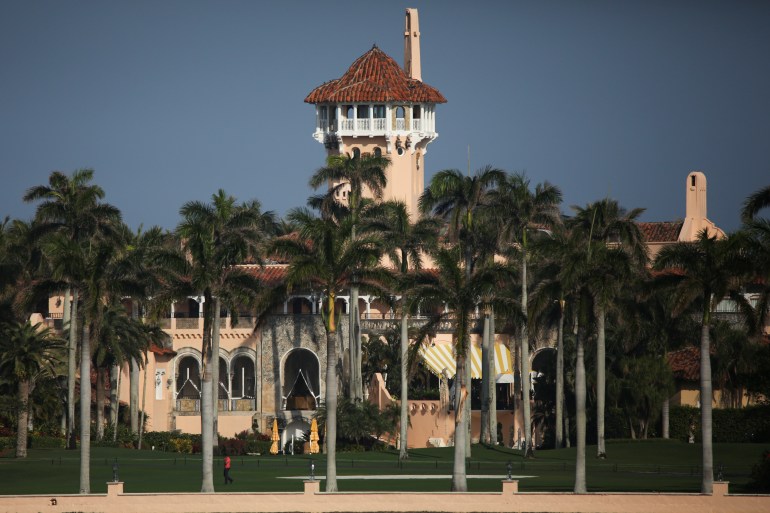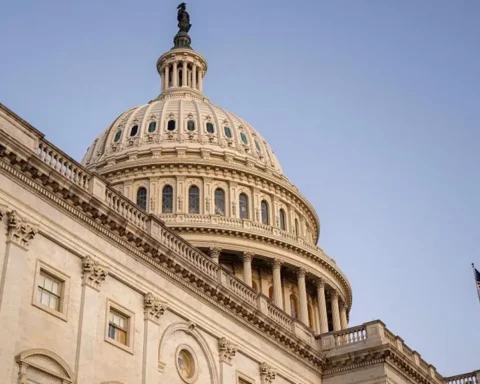Redacted document provides more information about evidence that led to unprecedented search of Mar-a-Lago this month.
The US Department of Justice has released the highly anticipated affidavit that underpinned this month’s search of Donald Trump’s Florida home, confirming that the United States is investigating the alleged mishandling of classified documents by the former president.
The redacted document released on Friday provided more insight into the evidence that led the FBI to carry out an unprecedented search of Trump’s Mar-a-Lago estate on August 8.
Its release came after a federal judge on Thursday ordered the Department of Justice to release a redacted version that had been submitted to the court.
“The government is conducting a criminal investigation concerning the improper removal and storage of classified information in unauthorized spaces, as well as the unlawful concealment or removal of government records,” read the 38-page affidavit, substantial portions of which were blacked out.
The document stated that the US National Archives and Records Administration (NARA) had received 15 boxes of documents from Trump’s office in January. “The FBI’s investigation has established that documents bearing classification markings, which appear to contain National Defense Information (NDI), were among the materials,” it read.

The affidavit added that the Department of Justice believed “additional documents that contain classified NDI or that are Presidential records subject to record retention requirements currently remain” at Trump’s home.
“There is also probable cause to believe that evidence of obstruction will be found,” it said, describing the materials as “illegally possessed”.
The Department of Justice had opposed releasing the affidavit, arguing that it was “highly likely to compromise future investigative steps” and the identity of witnesses. But media organisations had asked for the document to be made public, citing “utmost public interest”.
US Magistrate Judge Bruce Reinhart said last week that he believed “there are portions of the affidavit that could be unsealed” and ordered the Department of Justice to submit a redacted version for his review.
Al Jazeera’s Alan Fisher, reporting from Washington on Friday, said the redactions aim “to protect both human sources” as well as the identities “of agents who had been involved [in the search] because they were worried about their safety”.
The search of Mar-a-Lago spurred a firestorm of Republican criticism against the FBI and the Department of Justice, with several GOP lawmakers accusing the Biden administration without evidence of investigating Trump for political reasons.
After the redacted affidavit’s release, Trump again rebuked the search of his home, calling it a “total public relations subterfuge” by the FBI and the Justice Department. “Judge Bruce Reinhart should NEVER have allowed the Break-In of my home,” he wrote on his platform Truth Social.
US Attorney General Merrick Garland has defended the search, saying earlier this month that he had personally approved it.
The search warrant was released on August 12, revealing that the Department of Justice was investigating the former president for mishandling classified documents. The court records showed the FBI seized some top secret documents from Trump’s home, but they did not provide details about the information they might contain.
“Top secret” is the highest level of classification of US government documents, and US law prohibits making public or mishandling classified documents.
President Joe Biden has denied having prior knowledge of the search, and the White House has insisted that it does not interfere in Department of Justice-led investigations.
Asked whether Trump’s conduct may have threatened national security, Biden told reporters on Friday: “We’ll let the Justice Department determine that.”
Trump had argued that the search was unwarranted because he would have handed the documents over if asked. He also said the records were declassified before he left office.
“There was no official record of any of these documents being declassified,” Al Jazeera’s Fisher reported. “And so now the FBI and others are looking at the possibility that there was sensitive information where it shouldn’t have been and there was obstruction in getting ahold of that information.”






